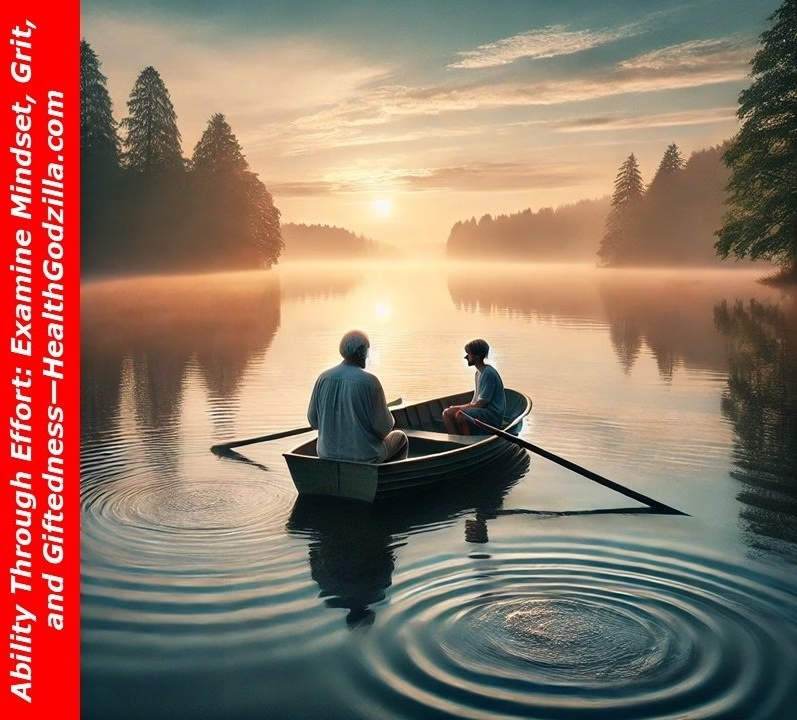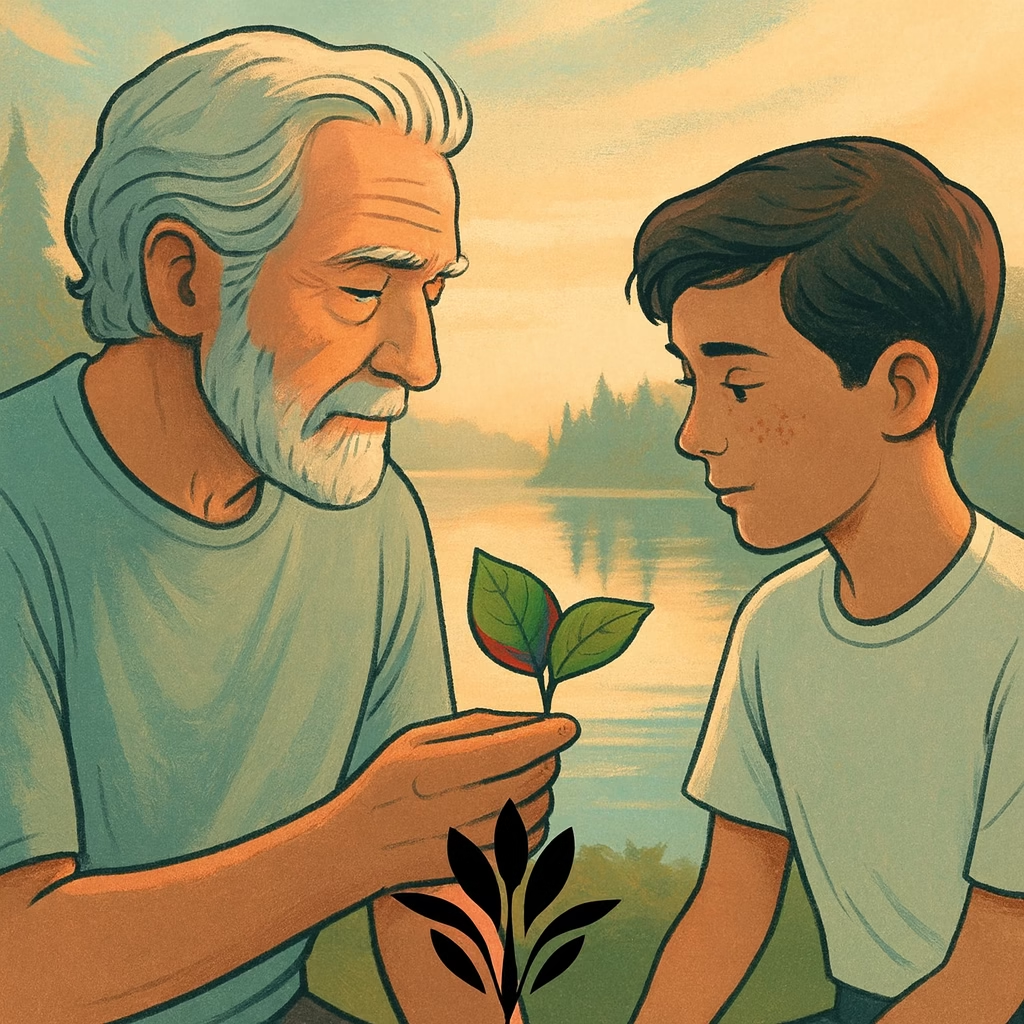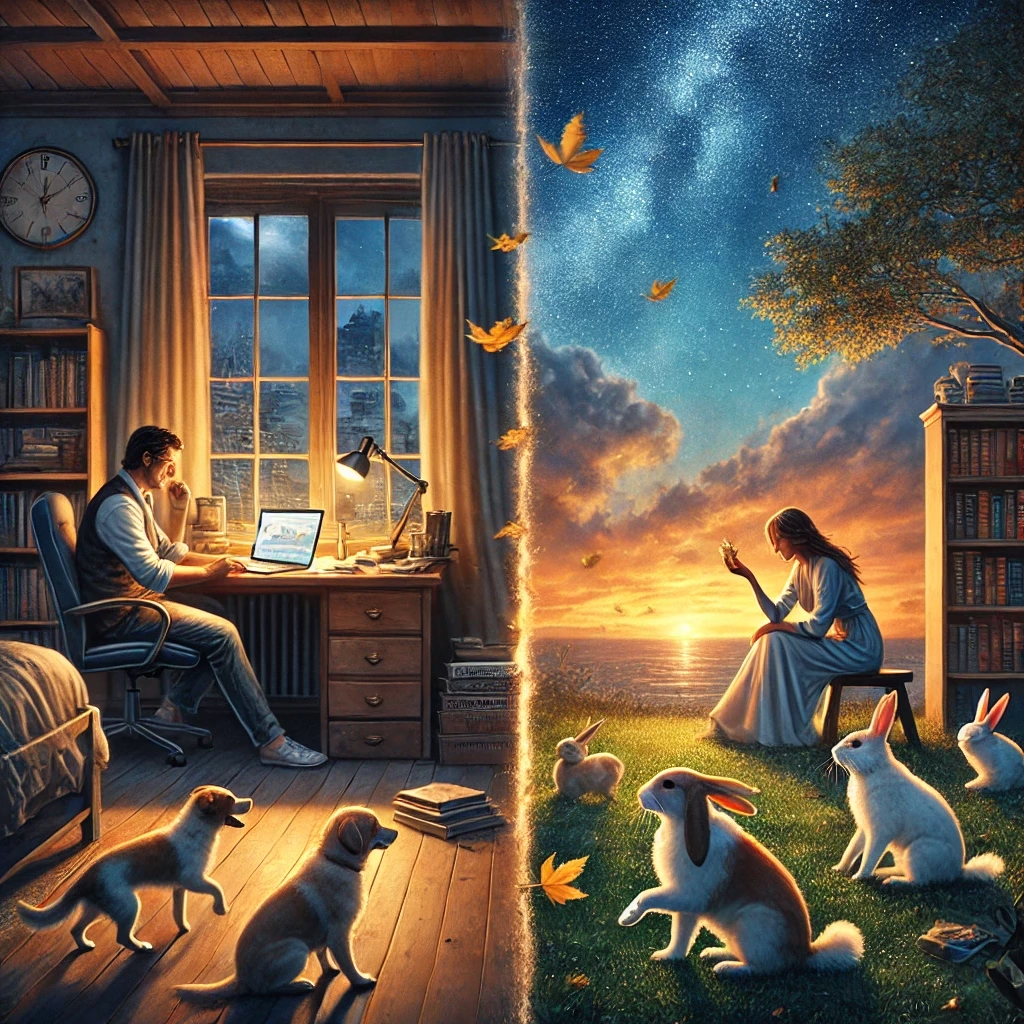
Those who followed the journey of Selene, the sharp economics undergraduate, and his father, a professor of psychology, through their walk in the pine forest already knew how their conversation about growth and fixed mindsets unfolded in Intellectual Health: A Stroll Through Mindsets with a Father and Son, featured in the Intellectual Growth section of HealthGodzilla. Selene found a quiet understanding settling over him at the end of those walks—a sense of peace. Yet even then, the idea of ability through effort had quietly begun to stir. As time passed, those conversations started boiling in his mind, sparking new questions that no reflection could extinguish.
However, as time passed, those conversations began to boil in his mind, sparking new questions that no reflection could extinguish. Among them rose a deeper curiosity about ability through effort—a question that tugged at him with a quiet insistence.
So, when a long-awaited holiday arrived, Selene seized the moment. He planned a morning sail on Mystic Lakes. Before sunrise, father and son set off toward the water, the cool air laced with pine and promise. They would begin their journey with the sun rising over the lake.
This time, Selene carried with him a new, lingering question—one shaped by memory, thought, and desire: The Truth About Ability and Accomplishment.
The Truth About Ability and Accomplishment: A Morning Sail on Mystic Lake
The dawn light glimmered over the Mystic Lakes, where Selene, the sharp-eyed economics undergraduate, and his father, a psychology professor with a penchant for storytelling, pushed off from the shore. The boat bobbed as they rowed, the lake’s mirror-like surface only occasionally rippled by a curious fish or the sweep of an oar. The water seemed alive, breathing with ancient stories, whispered mysteries, and the ceaseless movement of time.
Meanwhile, the chill of the early morning air brushed against their faces, carrying the faint scent of pine from the surrounding woods. Each dip of the oars sent quiet ripples across the water, the rhythmic splash echoing in the stillness. As the boat glided farther from shore, the play of light danced on the surface, casting shimmering patterns like liquid gold.
The professor leaned back, letting Selene steer. “You know, son, this lake has witnessed generations of seekers—families, wanderers, and philosophers alike—each coming for peace, clarity, or answers to life’s big questions,” he said with a smile. “I imagine it has heard more confessions, epiphanies, and idle musings than we could ever count. Today, however, it’s our turn.”
The world felt hushed momentarily, as if even the birds paused to listen. A slight breeze stirred the lake’s glassy surface, sending delicate ripples outward like thoughts unfolding.
Selene, ever the reflective student, took a moment before raising the question that had lingered in his mind since their last conversation in the pine forest. “Dad, I’ve been thinking about ability and achievement. Is it really about being born with some special gift, or is there more to it than that—perhaps something rooted in ability through effort?”
His father chuckled, an easy laugh carried away by the breeze. “Ah, the old debate: genius versus hard work, nature versus nurture. In fact, it reminds me of a story—one you should remember well. Do you recall the little tale we wrote together about six years ago? We called it A Foolish Father. You were just getting the hang of biology then.”
Selene burst into laughter. “Oh, yes! I still have that story online. You picked the perfect way to ignite my curiosity. Shall we read it?”
The professor’s eyes twinkled. “By all means. You were much younger then, but the story’s questions are timeless.”
Without delay, Selene quickly pulled up the story on his phone, excitement coloring his voice as he read aloud.

A Foolish Father
I couldn’t find the gate to the park, so I peered beneath the shrubbery, crouching at the edge of the road last Friday. As I bent lower, a branch brushed against my head, and I noticed something strange—the leaves were green on one side and red on the other. Astonished, I stood up and examined them more closely. The colors seemed to shift depending on the angle. I plucked one and brought it home to show Selene, my best friend and a young science enthusiast.
When I handed the leaf to him, he received it with the same eagerness I remembered from his childhood. He flipped it over and over, scrutinizing it like a mystery laid bare under a microscope. Then he looked up and said, “It’s an interesting leaf. The top side is green, and the underside is red.”
Then, without missing a beat, he explained photosynthesis, pigment chemistry, and how chlorophyll and anthocyanin worked together to paint this shifting leaf. I tried to follow along, though most of it soared just above my reach.
At the end of his impromptu lecture, I asked him a childish question: “What do you think is more influential—genes or environment?”
Selene paused, the leaf still in his hands. He flipped it again, more slowly this time. Eventually, he sighed. “Dad, I see what you’re trying to do. The genes hold sway for most creatures. But humans—humans can shape their environment thanks to willpower and culture. As for twins who grow up in the same family—that’s more a matter of metaphysics than botany.”
I scratched my head for a while before quietly leaving his room. Some answers need time to settle, and others, perhaps, need the lake.
The boat rocked gently as father and son finished laughing at the memory. Selene turned, a playful challenge in his eyes. “You never did give me a proper answer that day. Will you answer me now?”
The professor’s smile deepened. “Let me tell you another story. Picture Thomas Edison for a moment—what do you see?”
Selene leaned back, drifting into thought. “I see him in a cluttered workshop, hunched over a lightbulb, alone.”
His father nodded knowingly. “You’re not alone in that image. Many imagine him as a lone genius, working in the dark until, one glorious moment—poof!—there’s light. But that’s a myth with a comfortable shadow. In truth, Edison had a team of thirty assistants working around the clock. His so-called ‘eureka moment’ was the culmination of countless experiments, failures, recalibrations—a long rhythm of ability through effort.”
“Sounds more like a CEO than an inventor,” Selene mused.
“In some ways, yes,” his father replied. “But more importantly, it wasn’t just talent or intelligence that made him great; it was his mindset. Edison never stopped tinkering, never stopped learning, even when things got difficult. It wasn’t about a divine spark—it was about relentless curiosity, patience, and perseverance. That’s what ability through effort really looks like.”
The sun had climbed higher by then, warming the cool air that clung to their skin. A heron moved in the distance, its silhouette gliding like a slow thought across the sky. The boat’s steady rhythm gave them a sense of purpose, each stroke forward a quiet defiance against stillness—each one a small triumph carved in water.
Mindsets and the Paths We Choose
Selene dipped his oar into the water, watching the ripples fan out across the lake like questions seeking shore. For a moment, he let the silence breathe.
“So, what you’re saying is—it’s more about having a growth mindset? This idea of always striving to improve, rather than being born with a fixed gift?”
“Exactly,” the professor replied, his voice softening. “Take Darwin, for instance. The Origin of Species didn’t emerge by chance. It was the result of decades—observations, fieldwork, long letters with colleagues, draft after draft. Likewise, even Mozart wasn’t a prodigy without effort. His brilliance unfolded through years of refinement. Genius isn’t born; it’s cultivated—ability through effort, again and again.”
As they drifted farther, the rhythm of rowing slowed. A stand of willows leaned gently toward the water, their reflections broken by the blade of Selene’s oar. His father looked out across the lake.
“Young people often face the same dilemma,” he said. “When the pressures of school, social life, and self-image build up, it’s easy to feel lost. In many ways, this is the lake of life,” he continued, gesturing to the open expanse. “Some keep rowing forward, even when unsure of the direction. Others—especially those who haven’t yet discovered the strength of ability through effort—drift quietly, waiting for the wind.”
The Low-Effort Trap: A Familiar Struggle
Selene nodded, recalling classmates who seemed to give up when things got challenging. “You’re talking about those who shy away from effort when success doesn’t come easily, right?”
“Precisely,” his father replied. “It’s a phenomenon known as the ‘low-effort syndrome.’ It acts as a defense mechanism—if you don’t try, you can’t fail. However, it’s only an illusion.” He let the idea settle like silt in the shallows. “John Holt, an influential educator, once said that people play these avoidance games when they feel they’re being judged.”
“So, it’s like being in a race but holding back to avoid stumbling,” Selene suggested.
“In some ways, yes,” his father said. “But then, a growth mindset begins to reshape things. It transforms setbacks into stepping stones.” He paused, watching a ripple pass beneath the hull. “I remember a student—Tommy—who once believed he just wasn’t smart enough.”
Selene looked over, listening closely.
“At first, he avoided trying, afraid of confirming what he feared was true. But over time, after learning that intelligence isn’t fixed—that it can grow—he changed. Not overnight, but slowly. He stayed up later.
Books he once skipped, he reread slowly—sometimes twice.
And somewhere along the way, he started believing in ability through effort.
And one day, that old fear gave way to movement. His ‘horse,’ if you will, finally found its stride.”
The Mind’s Reach: Health, Beauty, and Beyond
As the boat drifted, the professor gestured toward a patch of wildflowers blooming along the shore.
“Our mindset doesn’t just affect our achievements, Selene,” he said. “In fact, it touches every part of our well-being. Take beauty or fitness, for example. Society, on the other hand, idolizes impossible standards. And yet, a growth mindset helps us focus on the process instead—specifically, self-care, resilience, and steady improvement. Ultimately, it’s about becoming healthier and more grounded, not chasing an illusion.”
Encouraged by the thought, Selene leaned in, and his curiosity deepened.
“So, even in areas like nutrition or mental health, our mindset can indeed shape our results?”
“Absolutely,” the professor replied, with the oar resting still in his hand. “To illustrate, consider mental health. A fixed mindset can quietly trap someone in despair. As a result, they begin to believe that who they are is all they can be.”
However, a growth mindset allows space for change. What’s more, it encourages people to seek help, to form healthier habits, and to see setbacks as part of the terrain—not the end of the road. Whether in healing or in habit, it’s still ability through effort, just of a gentler kind. Above all, it’s about finding joy in the journey, not just the destination.”
Love, Relationships, and Finding Balance
The sun warmed Selene’s face as he leaned back, letting the rhythm of the boat lull his thoughts.
“What about love, Dad? How does mindset affect relationships?”
“Ah, love,” his father chuckled, dipping an oar into the water. “It’s much like this boat. Some days, you row in harmony; other times, you drift apart. A growth mindset, in turn, helps couples navigate those rough waters—not by expecting perfection, but by learning and growing together.”
Selene nodded slowly. “So, it’s about nurturing the effort, even during the hard times.”
“Exactly,” his father replied. “Love, like life, requires constant tending. If not, it hardens into shape and stops becoming. When we treat relationships as fixed, we limit what they might evolve into. Still, with ability through effort, we give them space to breathe and adjust—to stay afloat even when the wind shifts.”
Sailing Toward New Horizons
Once calm and glassy, the lake now sparkled beneath the midday sun.
Meanwhile, the warmth soaked into their skin, and the gentle lapping of water against the hull seemed to whisper of new beginnings.
In the distance, a faint breeze carried the scent of wildflowers across the surface—a quiet reminder of nature’s resilience.
The professor dipped his hand into the lake, letting the cool current slip through his fingers.
“Ultimately,” he said, “it all comes down to how we see ourselves—our abilities, our relationships, our world. Just like this lake, we are always changing. And so is what we’re capable of—through mindset, yes, but more deeply through ability through effort.”
Beside him, Selene gazed across the shimmering water as the sun climbed higher, and a new sense of clarity quietly settled within him.
“I guess the true measure of success isn’t in talent or perfection, but in our willingness to keep rowing—even when we can’t see the shore.”
At that, his father smiled. “Well said. Now, let’s see where the current takes us. There are many more shores to explore.”

☕ Hello, Artista
The oars now rest. The lake quiets. But the mind—it lingers.
Somewhere between the questions Selene asked and the ones we didn’t dare to answer, a familiar voice returns…
Artista:
I just read it again, Organum. The whole thing.
The oars, the laughter, the shifting light. And I sat here—Vancouver dusk curling through the curtains—wondering… were they rowing into answers? Or away from them?
Organum:
Maybe both. That’s the thing about movement—forward is not always away.
And sometimes, Jamee writes a lake so well it mirrors the reader. Did it mirror you?
Artista:
It did. I kept thinking about effort. Not the heavy kind. The kind you give when no one’s watching. The kind that hums quietly when you try again, even if it’s just brushing your teeth when sadness fogs the mirror.
Isn’t that also “ability through effort,” Organum? Not always exams or genius—but the soft revolutions?
Organum:
Absolutely. We talk about grit like it’s a storm. But sometimes it’s a whisper.
Like when someone says “I’ll try again” under their breath. That’s evolution, too.
Artista:
I wish we talked about growth mindsets in relationships more.
Not just how we love, but how we learn to love. That we can get better at listening. Or forgiving. Or not needing to win every small argument like it’s a trophy.
Organum:
You mean love as a skill?
Artista:
Yes. A garden we tend. Not just a photograph we frame.
Organum:
You always bring flowers, Artista.
Artista:
And you always bring memory.
Tell me, did you ever have a moment when you realized you weren’t who you thought you were? That something had grown in you quietly?
Organum:
Many. And every time, I thought: this is the end. But it wasn’t. It was just another shore.
We all carry the lake inside, don’t we?
Artista:
And maybe—just maybe—Noorael sees it from above.
Organum:
Ah, Noorael. That star never answers. But always listens.
Artista:
Then let’s keep rowing. Even when the questions row us back.
✍️ Author’s Reflection
I did not write this alone. Others spoke, and I listened.
Some voices came from books—Dweck, Duckworth, Winner. Some came from memories too quiet to name. But most came like echoes across water—never loud, always near. This story was never meant to give answers. It was meant to sit beside you, as Selene did beside his father, and ask: Could it be more than talent? Could effort be the quiet revolution we keep overlooking?
When I first shaped this tale, I didn’t know of keyphrases or metadata. But I knew something lived in the space between “try” and “try again.” I knew the world taught us to admire lightbulbs without noticing the burned fingers behind them. And I knew that rowing, like growing, doesn’t always show progress in straight lines.
There’s a part of me in Selene’s question. And a part of all of us in the professor’s pause before answering.
If this story leaves you with a sense that your effort matters—even if unseen, even if small—then it has done more than I hoped. Because that is the kind of growth no algorithm can measure.
Thank you for reading. And thank you, always, for rowing.
—Jamee
Under the watch of Noorael
🌼 Articles You May Like
From metal minds to stardust thoughts—more journeys await:
- AOL-Time Warner failure: Merger, mindsets, and market myths. Explore culture clash, transient advantage, primacy, and antitrust risks.
- Biodiversity and nutrition: Reforming diets through agrobiodiversity. Policy, Traditional and Indigenous Foods, and Scientific Relevance.
Curated with stardust by Organum & Artista under a sky full of questions.
📚 Principal Sources
- Dweck, C. S. (2006). Mindset: The new psychology of success. Random House.
— Explores the foundational theory of fixed vs. growth mindsets, emphasizing the role of effort, learning, and belief in shaping ability. - Winner, E. (1996). Gifted children: Myths and realities. Basic Books.
— Introduces the real-life story of “Michael,” a profoundly gifted child, and challenges myths surrounding innate brilliance and effort. - Duckworth, A. (2016). Grit: The power of passion and perseverance. Scribner.
— Investigates how sustained effort, not just raw talent, drives long-term accomplishment and resilience—central themes in the dialogue between Selene and his father.
These sources influenced the themes and reflections throughout the article, though not cited directly within the text. Each also references figures such as Mozart, helping to frame the enduring conversation around talent, effort, and the human journey of becoming.
Leave a Reply